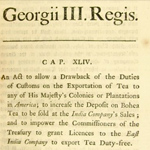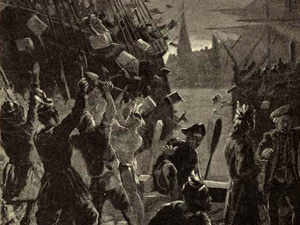The Tea Act: The Catalyst of the Boston Tea Party
The Tea Act, passed by Parliament on May 10, 1773, granted the British East India Company Tea a monopoly on tea sales in the American colonies. This was what ultimately compelled a group of Sons of Liberty members on the night of December 16, 1773 to disguise themselves as Mohawk Indians, board three ships moored in Boston Harbor, and destroy over 92,000 pounds of tea. The Tea Act was the final straw in a series of unpopular policies and taxes imposed by Britain on her American colonies. The policy ignited a “powder keg” of opposition and resentment among American colonists and was the catalyst of the Boston Tea Party. The passing of the Tea Act imposed no new taxes on the American colonies. The tax on tea had existed since the passing of the 1767 Townshend Revenue Act. Along with tea, the Townshend Revenue Act also taxed glass, lead, oil, paint, and paper. Due to boycotts and protests, the Townshend Revenue Act’s taxes were repealed on all commodities except tea in 1770. The tea tax was kept in order to maintain Parliament’s right to tax the colonies. The Tea Act was not intended to anger American colonists, instead it was meant to be a bailout policy to get the British East India Company out of debt. The British East India Company was suffering from massive amounts of debts incurred primarily from annual contractual payments due to the British government totaling £400,000 per year. Additionally, the British East India Company was suffering financially as a result of unstable political and economic issues in India, and European markets were weak due to debts from the French and Indian War among other things. Besides the tax on tea which had been in place since 1767, what fundamentally angered the American colonists about the Tea Act was the British East India Company’s government sanctioned monopoly on tea.
The Tea Act…was what ultimately compelled a group of Sons of Liberty
on the night of December 16, 1773 to disguise themselves as Mohawk Indians, board three ships moored in Boston Harbor, and destroy over 92,000 pounds of British East India Company tea.






